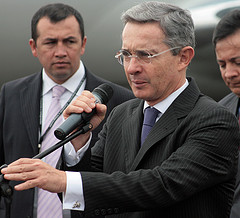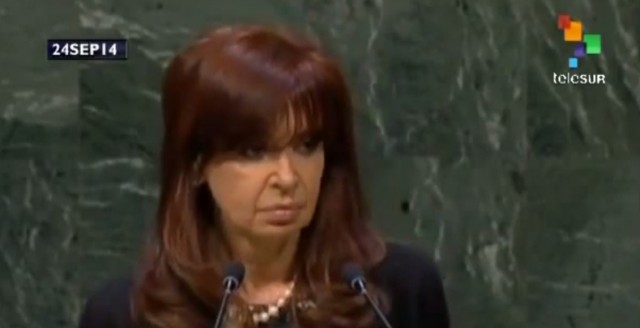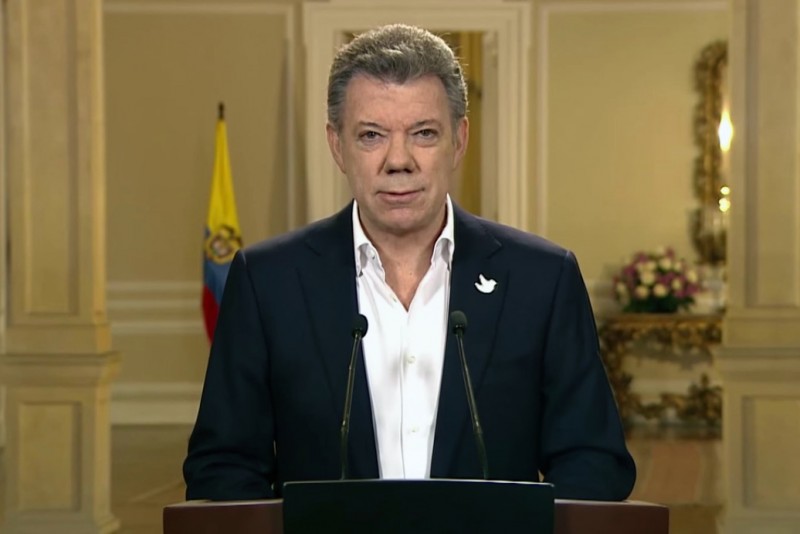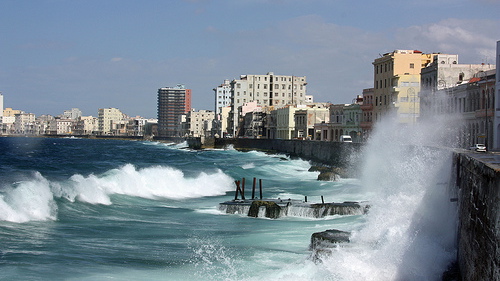
Colombia, Latin America: Week in Review, United States
U.S.-Colombian Base Deal Suspended By Constitutional Court
August 19, 2010 By Staff

Former president of Colombia, Álvaro Uribe.
Today in Latin America
Top Story — The Colombian Constitutional Court suspended Tuesday the proposed deal that would allow U.S. troops greater access to Colombian military bases and sent the agreement back to newly inaugurated President Juan Manuel Santos.
Former Colombian President Álvaro Uribe signed the deal last year and it would permit the U.S. to use the bases to help with operations against drug trafficking and terrorism.
However, the court said that the joint agreement was “an arrangement which requires the State to take on new obligations as well as an extension of previous ones” and that it should be an “international treaty subject to congressional approval,” according to the United Kingdom’s Telegraph newspaper.
“The Constitutional Court of Colombia … resolves to refer to the president the supplementary agreement for cooperation and technical assistance in defense and security between the governments of Colombia and the United States,” the court said, according to Reuters.
The deal, signed last October, would give the U.S. access to Colombian bases for 10 years and could see a total of 800 U.S. military personnel and 600 civilian defense contractors based in the South American nation.
The U.S., which since 2000 has given Colombia over $7 billion in aid, needed a new regional center of operations after Ecuador refused to resign a lease it had with the U.S.
The deal has been heavily criticized throughout the region and has been a point of contention between Colombia and Venezuela, who have recently renewed diplomatic relations.
Just Published at the Latin America News Dispatch
- While the Obama administration and Congress inch toward loosening travel restrictions against Cuba, the trade embargo remains a firm fixture of U.S. policy toward the island. But the prospect of oil drilling in Cuba is prompting officials and analysts to rethink that policy. Raisa Camargo has the story.
- A new report by the advocacy group National Council of La Raza says that programs allowing local police to enforce immigration law are ineffective and misuse authority. Alison Bowen has the story at her blog, Beyond Borders.
- Documents declassified by the National Security Archive in Washington indicate that the Nixon administration advocated the use of death threats in order to save Dan Mitrione, a U.S. official who was kidnapped and executed by leftist guerrillas.
Headlines from the Western Hemisphere
North America
- Mexico City’s left-wing mayor Marcelo Ebrard filed a defamation suit Wednesday against Cardinal Juan Sandoval Íñiguez of Guadalajara for suggesting he bribed the Supreme Court to uphold a law allowing adoptions by same-sex couples.
- Mayor Edelmiro Cavazos of Santiago, Mexico, was found dead on Wednesday, three days after he had been kidnapped.
- The first of more than 1,000 National Guard troops recently authorized by the Obama administration to be sent to the Mexican border been deployed in California.
Caribbean
- A Colorado man who founded a school for street children in Haiti acknowledged Wednesday that he sexually abused several, wrapping up a case in which prosecutors said he manipulated the boys with promises of food and shelter and threatened to expel them if they refused.
- In the space of two weeks, Wyclef Jean has redrawn the map of Haitian politics, emerging as a new force — and perhaps the leading contender — in a presidential election scheduled for November.
- President Barack Obama’s administration has granted permission for the American Ballet Theatre to perform in Cuba, clearing the way for the company’s first performance in Havana in 50 years.
Central America
- Costa Rican President Laura Chinchilla said Tuesday she wants the United States to offer an anti-drug aid program just for Central America.
- More than 2,000 participants from 18 countries are taking part in Panamax 2010, which kicked off August 16, and is a multinational maritime training exercises aimed at defense of the Panama Canal. The U.S. Southern Command and the Panamanian government cosponsor the event.
Andes
- Colombia’s air force bombed a rebel camp on Wednesday, killing seven leftist guerrillas from a small insurgent group in the northwest of the Andean nation, the country’s military said.
- A leading Venezuelan newspaper replaced front-page photos with the word “censored” Wednesday to protest a court’s month-long ban on the publication of information and photos about violence.
- Venezuelan lawmakers approved a measure Wednesday to block bank owners from also controlling large stakes in media companies, a move critics say is aimed at weakening powerful business groups that are opposed to President Hugo Chavez.
- Former Bolivian president Gen. Juan Pereda Asbun has been ordered into rehab after he allegedly harassed minors in public under the influence of marijuana.
- American activist Lori Berenson, who was convicted of aiding leftist rebels, surrendered to police on Wednesday after a court struck down a decision granting her parole and ordered her to return to prison, where she is to remain with her 15-month-old son for the time being.
Southern Cone
- Brazilian presidential candidate José Serra accused rival Dilma Rousseff of neglecting investment and economic reform, after Serra continued to lose ground in the election polls.
- A ban on public employees wearing miniskirts in Chile’s Coquimbo region was lifted after complaints from women.
- Paraguay exported over 100,000 tons of beef in the first seven months of 2010, generating $530 million.
Image: Presidencia de la República del Ecuador @ Flickr.





